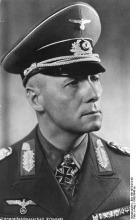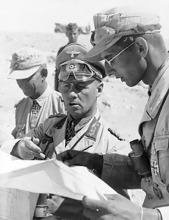Erwin Rommel - A Brilliant General on the Wrong Side of WWII
Erwin Rommel - A Brilliant General on the Wrong Side of WWII
Born November 15, 1891, Erwin Rommel might have led a completely different life had not fate and his father intervened. He originally wished to pursue a career as an engineer, but due to his father’s disapproval he ended up joining the German army. It was in the military that Rommel would gain his fame as well as his infamy, winning battle after battle for the armies of Adolf Hitler.
He was active during the First World War, fighting on the Western Front. His successes there later gained him a position on the Italian front. During the course of the first war he earned himself many promotions and medals. He rose through the ranks and, following the war, became a teacher at a military academy. Being an intelligent and skilled soldier, his lectures on infantry tactics would eventually be published. Hitler would read his words and recruit Rommel to help him in his ambitions for world conquest.
When World War II started, Rommel commanded forces in Western Europe, though it was in the Afrika Corps where he would make his name. His successes on that front were many, and the British armies affectionately nicknamed him the “Desert Fox.” Rommel was both feared and respected for his military genius. He was also known for being exceptionally civil when it came to prisoners of war. This behavior would gain him further respect from his enemies, who saw him as bringing as much civility as possible to the brutality of war.
As is the way of things, Rommel’s victories in Africa would eventually become defeats, and his forces were
overwhelmed by the better equipped and well-supplied British armies. His were the forces that suffered what is seen as the first major German defeat in WWII. He would be transferred from Africa to the French northern coast and be responsible for the defenses there, including the protection of Normandy. After D-Day, however, even Rommel’s brilliant tactics could not hold back the continued onslaught of the Allied Forces.Later, Rommel would be implicated in the bomb plot to assassinate Hitler in July of 1944. Though he was not actually involved in this plot, Hitler would imprison him due to suspicion of treason. Rommel never saw trial, however. Instead, Hitler allowed him to commit suicide in order to save himself and his family from humiliation. It was officially announced that Rommel had died of wounds sustained in battle.
Despite his being on the wrong side of the war, Erwin Rommel distinguished himself as one of history’s great military leaders. Near the end, he was an advocate of ending the war and bringing Hitler to bear for his crimes, but suffered for his foresight. Though history may not look kindly on him for his work in promoting the German conquest of Europe and Africa, he will forever be remembered by those who study military history as an interesting and brilliant practitioner of the craft of warfare.




